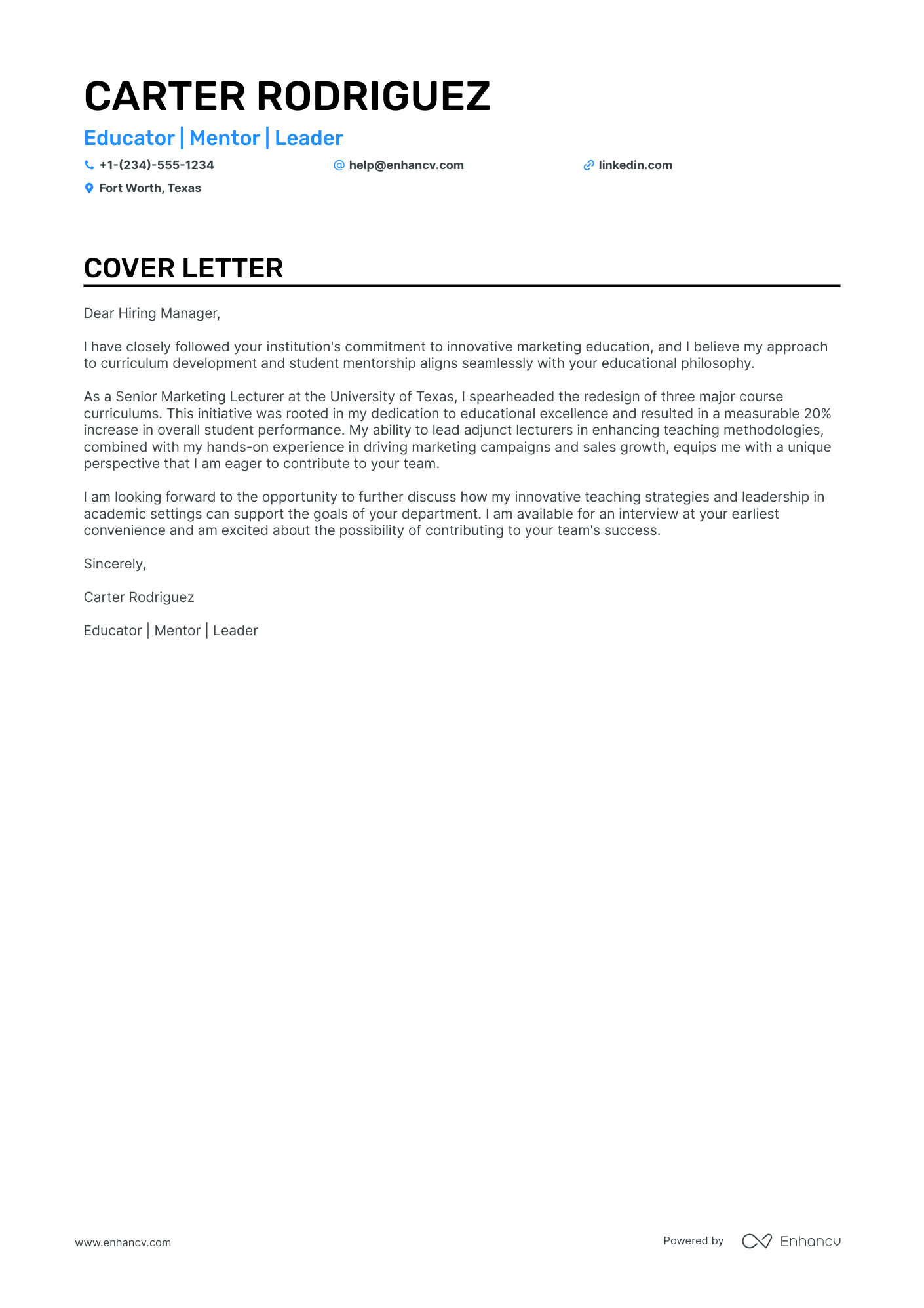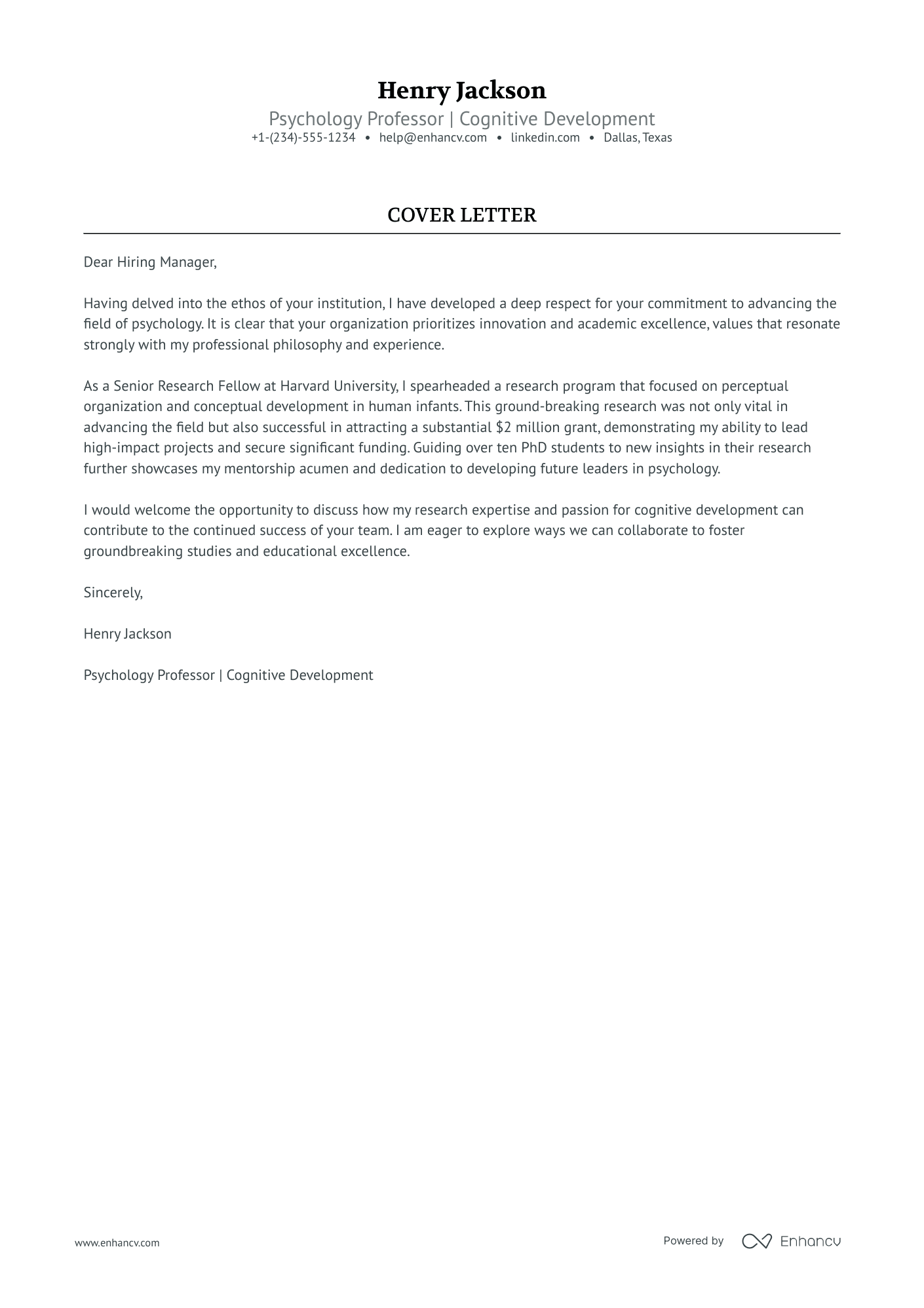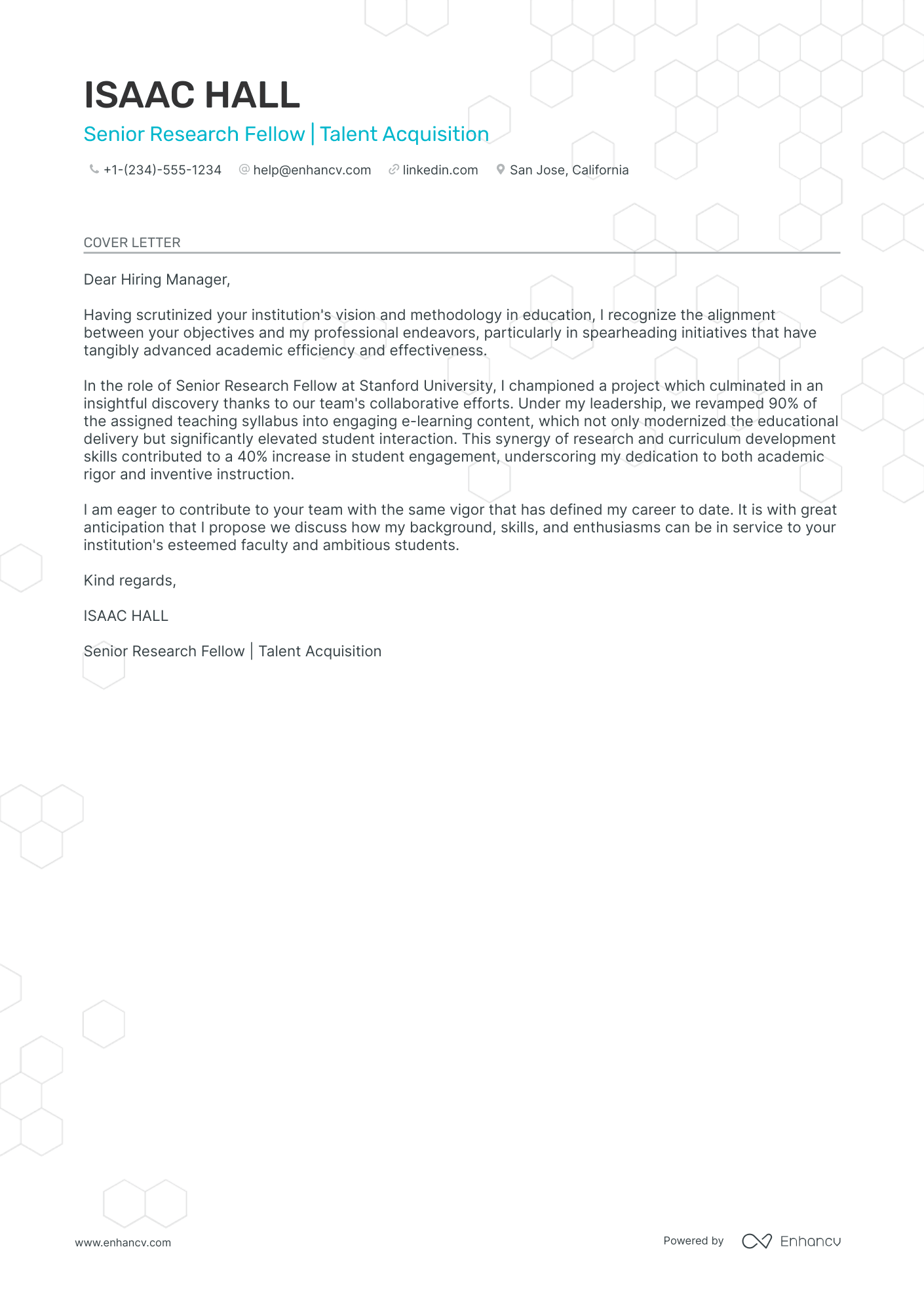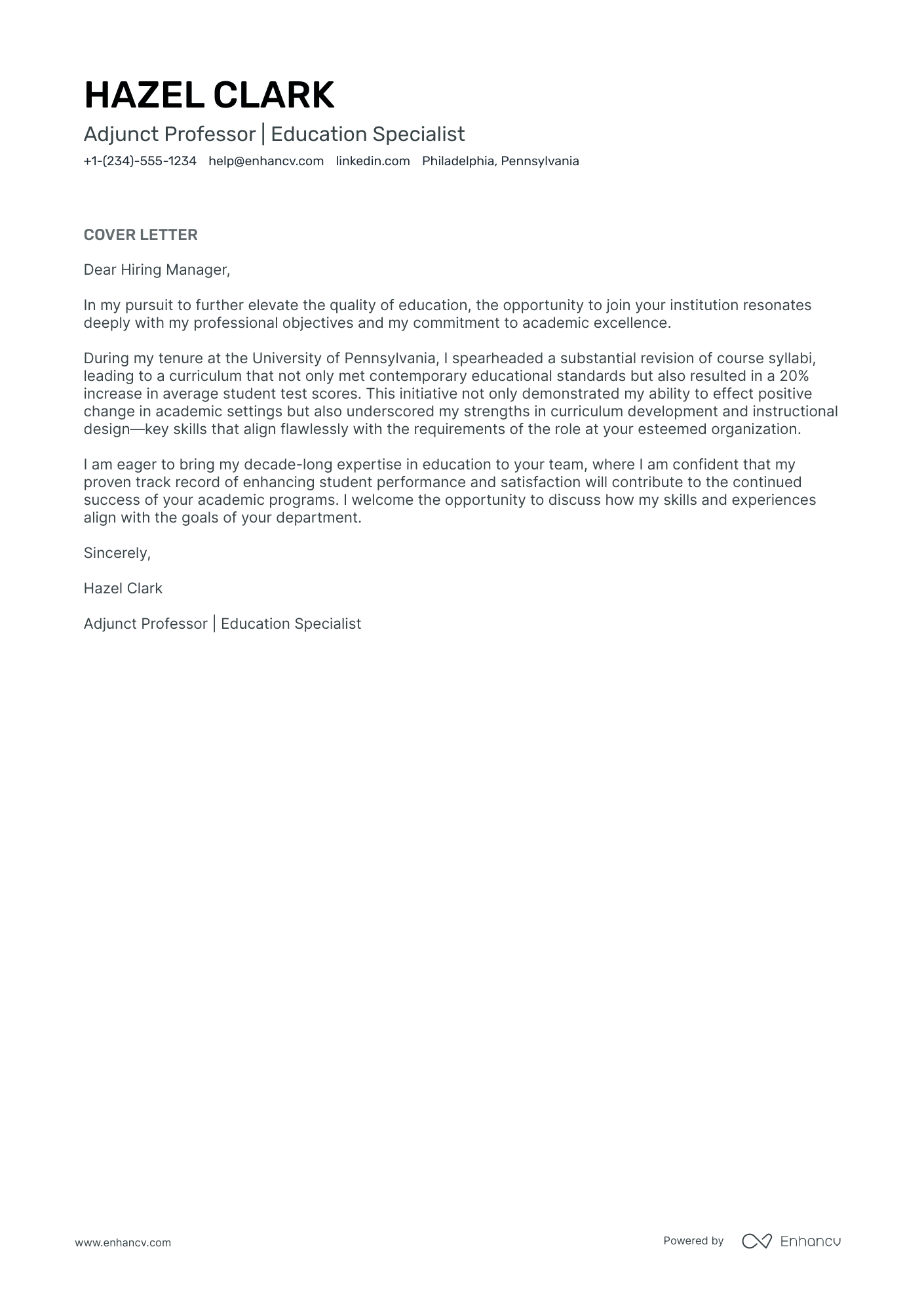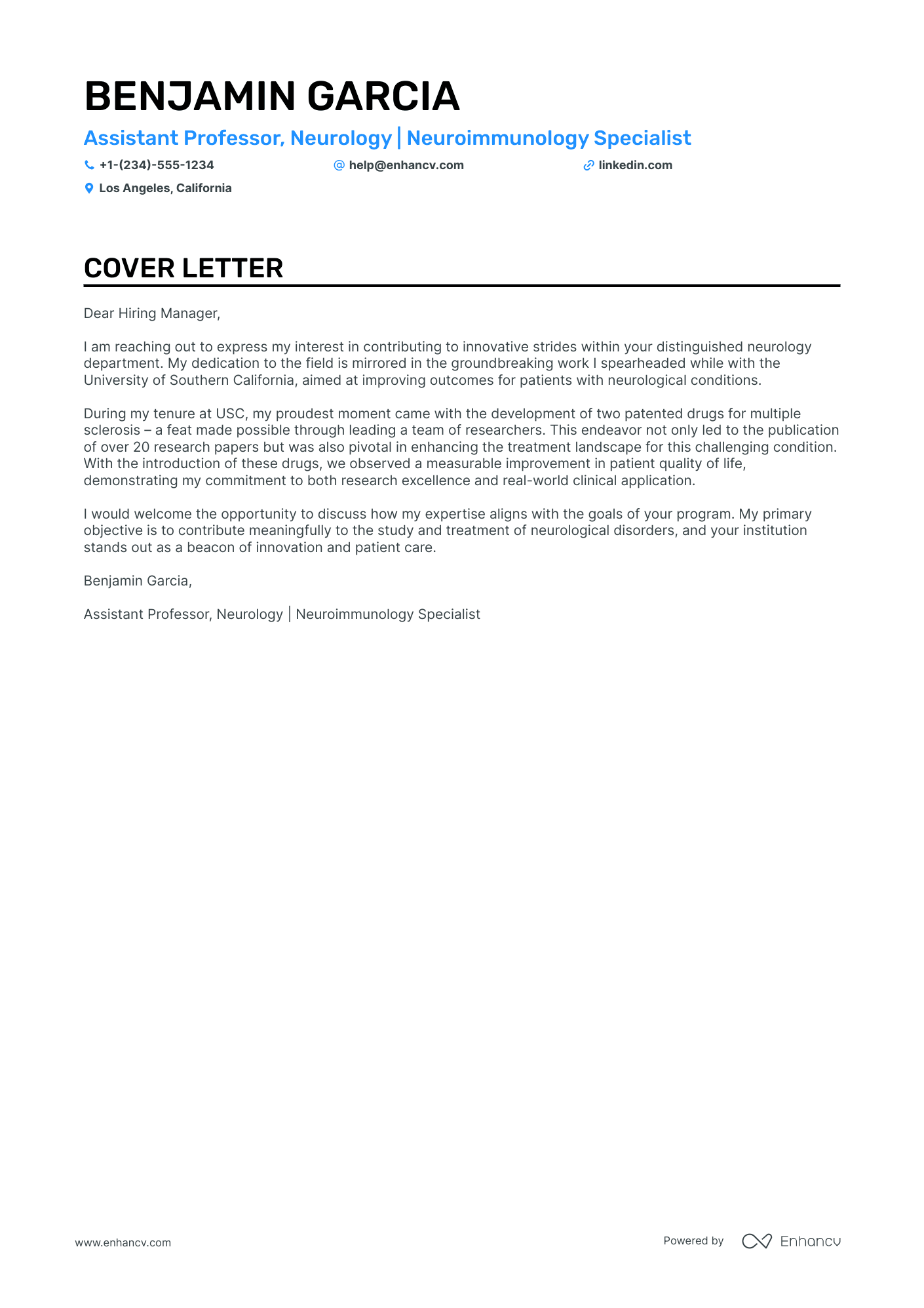Embarking on the job hunt, you've realized a well-crafted professor cover letter is expected alongside your resume. But here's the challenge: You must capture attention without echoing your CV, opting instead to spotlight that crowning professional achievement that defines you. Writing in a formal yet fresh tone can feel like a tightrope walk, all while keeping your story compelling and concise within a one-page limit. Let's unlock the secrets to creating that impactful, cliché-free cover letter.
- Personalize the greeting to address the recruiter and your introduction that fits the role;
- Follow good examples for individual roles and industries from job-winning cover letters;
- Decide on your most noteworthy achievement to stand out;
- Format, download, and submit your professor cover letter, following the best HR practices.
Use the power of Enhancv's AI: drag and drop your professor resume, which will swiftly be converted into your job-winning cover letter.
If the professor isn't exactly the one you're looking for we have a plethora of cover letter examples for jobs like this one:
Drop your resume here or choose a file.
PDF & DOCX only. Max 2MB file size.
Professor cover letter example
Hazel Clark
San Antonio, Texas
+1-(234)-555-1234
help@enhancv.com
The visual appeal of your professor cover letter: format, font, and structure
When using our cover letter builder, make sure to include these vital sections:
- Header (with your name, contact details, the role, and date);
- Greeting (that's personalized to the recruiter);
- Introductory paragraph (to capture attention);
- Body paragraph (to tell a story of how you've obtained your job-crucial skills);
- Closing paragraph (ending with a nod to the future ahead);
- Signature (that is not a must).
Our cover letter templates are already set up for you with the best professor cover letter design with single-spaced paragraphs and a one-inch margin.
As for the font of your professor cover letter, use the same one as you did in your resume (where modern and simple fonts, like Rubik and Bitter, take precedence over Arial and Times New Roman).
Your professor cover letter is created with the recruiters in mind - as no Applicant Tracker System looks over this part of your profile.
When sending over your professor cover letter, download it in PDF. This format allows your information and design to stay intact and to keep the same visual quality.
Tight on time? Our free cover letter generator helps you create a cover letter instantly from your resume.
The top sections on a professor cover letter
- Header: Includes your contact information, the date, and the recipient's details, essential for establishing professionalism and for ease of reference.
- Opening Greeting: Addresses the recipient by name or with a respectful title such as "Dear Search Committee," setting the tone for a personalized and respectful communication.
- Introduction: Introduces yourself, states the position you're applying for, and provides a hook—the unique aspect of your application that demands further reading, such as your passion or an impressive accomplishment in academia.
- Academic Experience and Achievements: Highlights your teaching philosophy, research interests, and scholarly contributions relevant to the position, demonstrating your qualifications and alignment with the department's focus.
- Conclusion and Call to Action: Wraps up the cover letter by summarizing your interest and suitability for the role, and expresses your eagerness to discuss your potential contribution in an interview, establishing a proactive stance.
Key qualities recruiters search for in a candidate’s cover letter
- Academic achievements: Recruiters look for a strong track record of relevant educational qualifications including advanced degrees and prestigious fellowships, as this indicates a commitment to academic excellence.
- Teaching experience: Demonstrated ability in teaching and mentoring students is critical, as this is a core component of most professorial roles.
- Research excellence: A history of published research, grant acquisition, and contributions to the field signal that the candidate can advance the institution’s research agenda.
- Subject matter expertise: Deep knowledge in a specific area of study shows that the candidate can add value to the department's academic offerings and reputation.
- Collaboration and collegiality: The ability to work well with others, both within the department and across interdisciplinary teams, is important for fostering a productive academic environment.
- Service and leadership: Evidence of involvement in academic service roles (e.g., committee membership, program coordination) and leadership potential indicate readiness to contribute to the institution's mission and governance.
How to greet recruiters in your professor cover letter salutation
As the saying goes, "You never get a second chance to make a first impression."
Write your professor cover letter salutation to be more personalized to the actual hiring manager, who is set to assess your profile by:
- greeting them on a first-name basis, if you have previously communicated with them (e.g. "Dear Sam,");
- using their last name, if you have more formal communication or haven't spoken to them (e.g. "Dear Mr. Harrows" or "Dear Ms. Marshall");
- writing "Dear HR Team" or "Dear Hiring Manager", if you have no clue about who's recruiting for the role.
Search on LinkedIn, Google, or the company website to find information as to the recruiter's name.
In any case, avoid the impersonal "Dear Sir or Madam".
List of salutations you can use
- Dear Dr. [Last Name],
- Dear Professor [Last Name],
- Dear Search Committee Chair,
- Dear Hiring Committee,
- Dear [University or College Department] Search Committee,
- Dear Dean [Last Name],
How to start your professor cover letter introduction
The opening paragraph of your professor cover letter can seem like a real enigma.
Where do you start writing?
In your professor cover letter introduction, focus on yourself by stating what:
- gets you motivated and excited about the role;
- you like best about the company, from culture to awards.
Write no more than two sentences, which are both authentic and show your enthusiasm for the opportunity.
How to write an achievement-focused professor cover letter body
We've got the intro and greeting covered. Now, comes the most definitive part of your professor cover letter - the body.
In the next three to six paragraphs, you'd have to answer why should recruiters hire you.
What better way to do this than by storytelling?
And, no, you don't need a "Once upon a time" or "I started from the bottom and made it to the top" career-climbing format to tell a compelling narrative.
Instead, select up to three most relevant skills for the job and look back on your resume.
Find an achievement, that you're proud of, which has taught you these three job-crucial skills.
Quantify your accomplishment, using metrics, and be succinct in the way you describe it.
The ultimate aim would be to show recruiters how this particular success has built up your experience to become an invaluable candidate.
Final words: writing your professor cover letter closing paragraph
The final paragraph of your professor cover letter allows you that one final chance to make a great first impression.
Instead of going straight to the "sincerely yours" ending, you can back up your skills with a promise of:
- how you see yourself growing into the role;
- the unique skills you'd bring to the organization.
Whatever you choose, always be specific (and remember to uphold your promise, once you land the role).
If this option doesn't seem that appealing to you, close off your professor cover letter with a follow-up request.
You could even provide your availability for interviews so that the recruiters would be able to easily arrange your first meeting.
Keep this in mind when writing your zero experience professor cover letter
Even though you may not have any professional experience, your professor cover letter should focus on your value.
As a candidate for the particular role, what sort of skills do you bring about? Perhaps you're an apt leader and communicator, or have the ability to analyze situations from different perspectives.
Select one key achievement from your life, outside work, and narrate a story that sells your abilities in the best light.
If you really can't think of any relevant success, you could also paint the picture of how you see your professional future developing in the next five years, as part of the company.
Key takeaways
Creating your professor cover letter should be a personalized experience for the role and the recruiter, where you:
- Format your cover letter using the same ATS-friendly font (e.g. Railway) as you did for your resume;
- Greet recruiters, using their name, and follow up with two sentences to introduce yourself, your interest in the role, and to stand out;
- Map out one key success from your career (or life) that has taught you job-crucial skills;
- Substitute your lack of experience with an achievement from your internships, degrees, or volunteering gigs;
- End with a promise for your potential or your availability for an interview.
Professor cover letter examples
By Role
